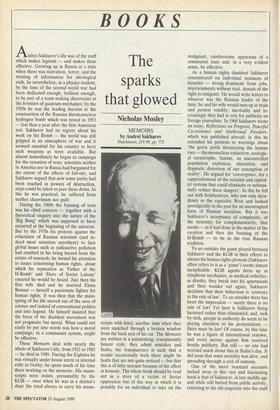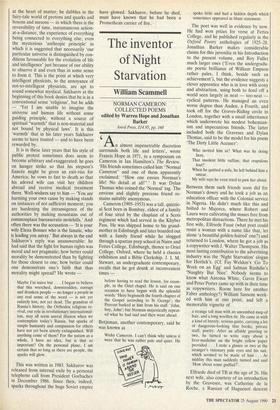The sparks that glowed
Nicholas Mosley
MEMOIRS Andrei Sakharov's life was of the stuff which makes legends — and makes them effective. Growing up in Russia at a time when there was starvation, terror, and the twisting of information for ideological ends, he nevertheless, as a physics student, by the time of the second world war had been dedicated enough, brilliant enough, to be part of a team making discoveries at the frontiers of quantum mechanics; by the 1950s he was the leading theorist in the construction of the Russian thermonuclear hydrogen bomb which was tested in 1953 — less than a year after the first American test. Sakharov had no regrets about his work on the Bomb — the world was still gripped in an atmosphere of war and it seemed essential for his country to have such weapons as were available. But almost immediately he began to campaign for the cessation of tests: scientists neither in America nor in Russia had bargained for the extent of the effects of fall-out, and Sakharov argued that now some parity had been reached in powers of destruction, steps could be taken to pare these down. In this he was practical; he suffered from neither chauvinism nor guilt.
During the 1960s the banning of tests was his chief concern — together with a theoretical enquiry into the nature of the `Big Bang' which was supposed to have occurred at the beginning of the universe. But by the 1970s his protests against the reluctance of Russian scientists (and in- deed most scientists anywhere) to face global issues such as radioactive pollution had resulted in his being barred from the centre of research; he turned his attention to issues concerning human rights, about which his reputation as 'Father of the H-Bomb' and 'Hero of Soviet Labour' ensured he would be heard. Just then his first wife died and he married Elena Bonner — herself a passionate fighter for human rights. It was then that the main- spring of his life moved out of the area of science and indeed of conventional politics and into legend. He himself insisted that the force of the dissident movement was not pragmatic but moral. What could not easily be put into words was how a moral campaign, in a communist system, might be effective.
These Memoirs deal with nearly the whole of Sakharov's life, from 1921 to 1983 — he died in 1989. During the Eighties he was virtually under house arrest in internal exile in Gorky; he spent much of his time there working on the memoirs. His manu- scripts were stolen, presumably by the KGB — once when he was in a dentist's chair (he tried always to carry his manu- scripts with him); another time when they were snatched through a broken window from the back seat of his car. The Memoirs are written in a painstaking, transparently honest style; they admit mistakes and faults; the transparency is such that a reader occasionally feels there might be faults that are not quite noticed — but that this is of little account because of the effort at honesty. The whole book should be read not as a story of a victim of Soviet oppression but of the way in which it is possible for an individual to take on the
malignant, cumbersome apparatus of a communist state and, in a very evident sense, be effective.
As a human rights dissident Sakharov concentrated on individual instances of injustice — wrong dismissals from jobs, imprisonments without trial, denials of the right to emigrate. He would write letters to whoever was the Russian leader of the time; he and his wife would turn up at trials and protest volubly; inevitably and in- creasingly they had to rely for publicity on foreign journalists. In 1968 Sakharov wrote an essay, Reflections on Progress, Peaceful Co-existence and Intellectual Freedom, which was published abroad: in this he extended his protests to warnings about `the grave perils threatening the human race — thermonuclear extinction, ecologic- al catastrophe, famine, an uncontrolled population explosion, alienation, and dogmatic distortion of our conception of reality'. He argued for 'convergence, for a rapprochement of the socialist and capital- ist systems that could eliminate or substan- tially reduce these dangers'. In this he fell out with Solzhenitsyn, who saw only deca- dence in the capitalist West and looked nostalgically to the past for an uncorrupted form of Russian socialism. But it was Sakharov's acceptance of complexity, of the necessity for complementarity, that seems — as it had done in the matter of the creation and then the banning of the H-Bomb — to be in the true Russian tradition.
To an outsider the game played between Sakharov and the KGB in their efforts to silence his human rights protests (Sakharov often refers to it as a 'game') seems almost inexplicable: KGB agents dress up as telephone mechanics, as medical orderlies, as drunks; they break into his apartments and then wander out again; Sakharov declaims that their behaviour is 'contrary to the rule of law'. To an outsider there has been the impression — surely there is no rule of law! Yet here is Sakharov being harassed rather than eliminated; and, inch by inch, people in authority do seem to be paying attention to his protestations there must be law! Of course, by this time he was a figure of international renown, and overt moves against him received hostile publicity. But still — no one had worried much about this in Stalin's day. It did seem that some morality was alive, and spreading through a sort of osmosis.
One of the more resonant accounts tucked away in this vast and fascinating book is that of Sakharov, in late middle age and while still barred from public activity, returning to his old enquiries into the stuff
at the heart of matter; he dabbles in the fairy-tale world of protons and quarks and bosons and mesons — in which there is the reversibility of time, instantaneous action- at-a-distance, the experience of everything being connected to everything else; even the mysterious `anthropic principle' in which it is suggested that necessarily 'our particular universe is distinguished by con- ditions favourable for the evolution of life and intelligence' just because of our ability to observe it and even thus in some sense to form it. This is the point at which very intelligent physicists, to the annoyance of not-so-intelligent physicists, are apt to sound somewhat mystical. Sakharov at the beginning of this book denies that he is in a conventional sense 'religious', but he adds — 'Yet I am unable to imagine the universe and human life without some guiding principle, without a source of spiritual "warmth" that is non-material and not bound by physical laws'. It is this 'warmth' that in his later years Sakharov seems to have trusted — and to have been rewarded by.
It is in these later years that his style of public protest sometimes does seem to become arbitrary and exaggerated: he goes on hunger strike so that his stepson's fiancée might be given an exit-visa for America; he vows to fast to death so that his adored wife can visit her children abroad and receive medical treatment there. Well-wishers say to him — 'You are harming your own cause by making stands on instances of not sufficient moment; you are hardening the intransigence of the authorities by making mountains out of commonplace bureaucratic molehills.' And often there was the accusation — 'It is your wife Elena Bonner who is the fanatic, who is leading you astray.' But always in the end Sakharov's reply was unanswerable: he had said that the fight for human rights was moral and not pragmatic; how better could morality be demonstrated than by fighting for those closest to one; how better could one demonstrate one's faith that thus morality might spread? He wrote -
Maybe I'm naive but . . . I began to believe that this wretched, downtrodden, corrupt
and drunken people — no longer a people in any real sense of the word — is not yet entirely lost, not yet dead. The grandeur of Russia's history, the Orthodox religious re- vival, our role in revolutionary international- ism, may all seem unreal illusion when we contemplate today's Russia, but sparks of simple humanity and compassion for others have not yet been utterly extinguished. Will anything come of them? For the nation as a whole, I have no idea, but is that so important? On the personal plane, I am certain that so long as there are people, the sparks will glow.
This was written in 1983. Sakharov was released from internal exile by a personal telephone call from President Gorbachev in December 1986. Since then, indeed, sparks throughout the huge Soviet empire have glowed. Sakharov, before he died, must have known that he had been a Promethean carrier of fire.











































 Previous page
Previous page